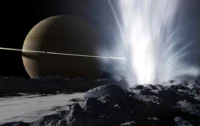But the universe seems to be an unknown space with neither beginning nor end. All we can look up to is the vast and endless black space. The universe has never told us its story, and we know nothing about it.
But the vast starry sky has always attracted human beings, and human beings have always maintained great curiosity about the universe. With the development of science and technology, it seems that the secrets of the universe are being revealed one by one. Then the truth about how empty the universe is is likely to be beyond your imagination.
How was the universe born?
To understand how empty the universe really is, we need to understand the history of the universe. In many Eastern and Western myths and stories, the universe is regarded as the creation of gods. In the West, people believe that God created everything, and the universe is naturally God’s work.
In the East, we believe that the Emperor of Heaven created everything in the world. But from the perspective of modern technology and theory, scientists believe that the universe was probably born in a “big bang”, which is the most famous “big bang” theory in astronomy.
As early as 1905, Einstein proposed the special theory of relativity, which caused a great sensation in the entire physics community at that time. In 1915, Einstein expanded the general theory of relativity on the basis of the original theory.
In general relativity, Einstein formulated a famous equation: the gravitational field equation. The emergence of this equation provides a certain theoretical basis for the subsequent Big Bang theory.
Einstein discovered through this equation that the universe seems to be changing over time, and this change may be either shrinking inward or expanding outward. In short, it is different from the static view of the universe originally conceived by Einstein.
Later, in order to solve this problem, Einstein added the “cosmological constant” to it. As long as the constant can take a reasonable value, this can also predict that the universe will not change with time.
But at that time, a physicist named Lemaitre discovered clues from Einstein’s formula. He believed that the universe in Einstein’s eyes was unstable.
So on this basis, Lemaitre proposed the “Cosmic Egg Hypothesis”, arguing that the earliest universe was actually formed from a “cosmic egg” about the size of an atom that was constantly expanding. Therefore, the “Cosmic Egg Hypothesis” is also called the primary theory of the Big Bang.
Later, under the observation of the astronomer Hubble, it seemed that he found evidence that could confirm that the universe was undergoing dynamic changes.
In Hubble’s observations, he found that the galaxies outside the Milky Way seem to be constantly moving away from us, and the speed of moving away is becoming faster and faster, which also shows that our universe is actually in constant expansion. of.
And this phenomenon happens to confirm Lemaitre’s “Cosmic Egg Hypothesis”, that our universe is indeed constantly growing.
In the follow-up further research, a scientist named Gamow combined the physical laws such as quantum mechanics to conduct a more in-depth study on the dynamic changes of the universe, and finally came up with the “nuclear fireball model”, which is That is the earliest predecessor of the Big Bang.
Because scientists believe that the Big Bang will definitely leave residual heat, this residual temperature is also called: cosmic microwave background radiation.
At the same time, scientists also believe that after the big bang, the mass ratio of hydrogen and helium in the universe will show a trend of 3:1, so such a cosmic microwave background and the abundance of helium are also considered to be the basis for the establishment of the big bang theory key.
How empty is the universe?
According to the current mainstream view, scientists infer from the cosmic microwave background radiation that our universe has expanded for 13.82 billion years, and during this process, the diameter of the universe has reached 92 billion light-years, and this value can even be higher big.
But these values are still theories after all, and according to research findings, the universe is actually still “growing up”, and the specific size of the universe is likely to far exceed our imagination.
Because the space of the universe is so large, the distance between the stars in the universe is actually very far from each other. Although people often say that there are more stars in the universe than all the sand on the earth, but in the universe , in fact, it is still “a barren land”.
Take the Milky Way, which we are most familiar with, the distribution of stars in the Milky Way is actually very uneven. The farther a star is from the center of the Milky Way, the lower the density of stars in the region will be. For every 326 light-years away from the center of the Milky Way, the density of stars drops by 2.9 stars per cubic light-year.
In our solar system, the density of our stars has been reduced to 0.004 stars per cubic light-year. Calculated according to the average value, the average density of stars in the Milky Way is about 0.006 stars per cubic light-year.
According to this value, in the Milky Way, there is only one star about every 167 cubic light years, and the distance between stars is actually very wide.
Moreover, there are cosmic voids in the universe, and many places have no stars at all. Seen this way, the universe is actually much more empty than we think
Conclusion: Conjectures about the future of the universe
The universe is actually still expanding, and the distance between stars will only get farther and farther.
But for humans, the expansion of the universe is a long process for us. As a small part of the universe, human beings need to wait longer if they want to explore more secrets of the universe. For the conjecture of the universe, we also need time to verify.




GIPHY App Key not set. Please check settings